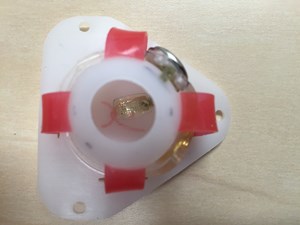Dec 12 2015
The UCHealth Eye Center at University of Colorado Hospital has performed the first "bionic eye" procedure in the Rocky Mountain region, restoring limited sight to a woman who has been blind for almost two decades. Only two centers in the Western United States have implanted the device, which uses a small camera and microchip to stimulate the patient's optic nerve.

Jamie Carley suffers from Retinitis Pigmentosa, a disease that causes cells in the retina to slowly die. For most RP patients, their vision gradually closes in on the sides. Many lose night vision first and eventually begin to lose their peripheral vision. Some, like Jamie, lose all of their vision. Last month, Dr. Naresh Mandava, Chair of Ophthalmology and Director of the UCHealth Eye Center, implanted a microchip in Jamie's eye. Now she will begin rehabilitation to learn how to interpret and use her new vision.
"Regaining even a little bit of my vision will make a huge difference in my life," said Jamie. "Being able to see the edges of doorways, stairs and sidewalks will make my life much easier, and I'm really looking forward to seeing family members and fireworks again."
For the first time, the Argus II Retinal Prosthesis System bionic eye implant offers the hope that patients who are blind from retinitis pigmentosa can regain small amounts of their vision. A pair of glasses with a camera wirelessly transmits video to the microchip implanted in the patient's eye.
"The microchip that was implanted on Jamie's retina is a 10x6 array of electrodes. That's 60 pixels of vision," said Dr. Scott Oliver, Chief, Vitreoretinal Surgery & Diseases for the UCHealth Eye Center. "Most of us are used to millions of pixels on our cell phone, in multiple colors. With this device, we're restoring the basics of vision. She should be able to see outlines of objects and be able to perceive light and dark. Many of us take for granted the ability to be able to tell if a person walks into a room or if the sun is up. It's very exciting to restore this ability to our patients."
Over the coming months, Jamie's brain will learn how to interpret the new optical signals it is receiving, and her new sight will steadily improve.
"It is a tremendous honor to restore sight. You don't understand the value of vision until you're losing it or have lost it," said Dr. Naresh Mandava. "When asked, people will tell you it is by far the most important sense. The device will significantly enhance Jamie's quality of life."
The UCHealth Eye Center is the largest and most advanced eye center in the Rocky Mountain region, and specialists from the University of Colorado School of Medicine care for patients with the most serious, vision threatening injuries and diseases.
"As the only academic medical center in the state, University of Colorado Hospital and the UCHealth Eye Center offer our patients the most advanced treatments available. We're improving the lives of our patients with technology like this bionic eye, which seemed like science fiction just a few years ago," said University of Colorado Hospital President and CEO Will Cook.
The UCHealth Eye Center is a national leader of vision-related research, and University of Colorado researchers have been awarded numerous patents for their development of new therapies and technologies.
Patients can call 720-848-2020 or visit www.uchealth.org for more information or to schedule an appointment.